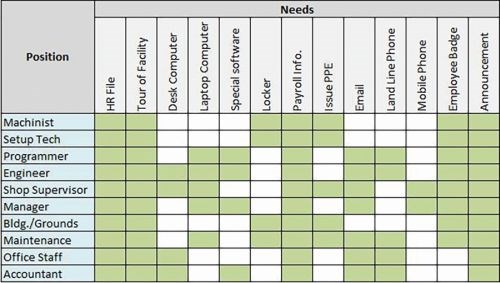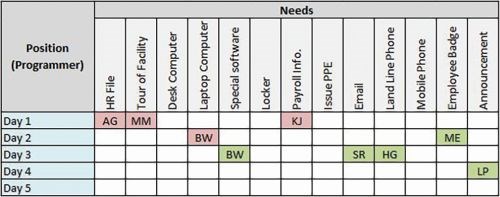The Onboarding Process
A position/needs matrix can help manage the plan for getting new employees started within a company.
Share




Certain to cause frustration for both a new employee and an employer is an ineffective process for getting new employees started within a company. This process, commonly known as “onboarding,” generally begins once a candidate accepts a position with the company and ends when the new hire has everything he or she needs to start the job. Unfortunately, in many organizations the onboarding process is not well-planned, nor well-managed. The result is a haphazard series of actions that eventually may meet the new employee’s needs, but at the very least does not present him or her with a good first impression of the company.
Many companies have started to evaluate their onboarding processes and have found numerous opportunities for improvement. Improvement begins when a company recognizes that a new employee is actually a customer, albeit an internal customer, and needs to be treated as such from day one. In order to satisfy this internal customer, a company must make the effort to understand what he or she needs to get started in the new position. Documenting these needs does take time up front, but once done, the onboarding process becomes much more effective.
So how does a company document the needs of each position within it? A simple position/needs matrix, created using any commercial spreadsheet software, works just fine. When companies do this, they often find a great deal of commonality in the needs of new hires, even for vastly different positions in the organization. This makes completion of the matrix less onerous than initially might be thought. The position/needs matrix shown here includes some of the more common needs of a new hire in a manufacturing company:

As you might imagine, most of the human resources-related tasks, such as creating employee files and processing payroll information, are common to all new hires. The needs of a specific position may produce some variability as to which tasks are shaded green, and therefore need to be addressed, in the matrix above. Recently hired employees can serve as excellent resources when developing a position/needs matrix. After all, their onboarding experiences, whether good or bad, are likely fresh in their minds.
Once the needs of a position are identified, resources must be assigned so action can be taken in a timely manner. This requires scheduling. Whenever possible, actions should be scheduled ahead of the new employee’s start date so he or she can be productive that much sooner.
A similar matrix (below) can be used to schedule the actions and resources, and to “manage” the onboarding process for new employees. As each action is completed, a color code (pink shading in this particular matrix) can indicate needs that have been fulfilled. The initials in each box indicate by whom. This allows everyone involved in the onboarding process to see how things are progressing in a simple, visual manner.

A position/needs matrix might serve your company well in getting its onboarding process under control. It can certainly help with planning what has to be done, assigning appropriate resources and, perhaps most important of all, managing the plan. What better way to make a new employee feel welcome than to allow him or her to experience a truly effective onboarding process.
Read Next
Setting Up the Building Blocks for a Digital Factory
Woodward Inc. spent over a year developing an API to connect machines to its digital factory. Caron Engineering’s MiConnect has cut most of this process while also granting the shop greater access to machine information.
Read MoreBuilding Out a Foundation for Student Machinists
Autodesk and Haas have teamed up to produce an introductory course for students that covers the basics of CAD, CAM and CNC while providing them with a portfolio part.
Read MoreRegistration Now Open for the Precision Machining Technology Show (PMTS) 2025
The precision machining industry’s premier event returns to Cleveland, OH, April 1-3.
Read More




























